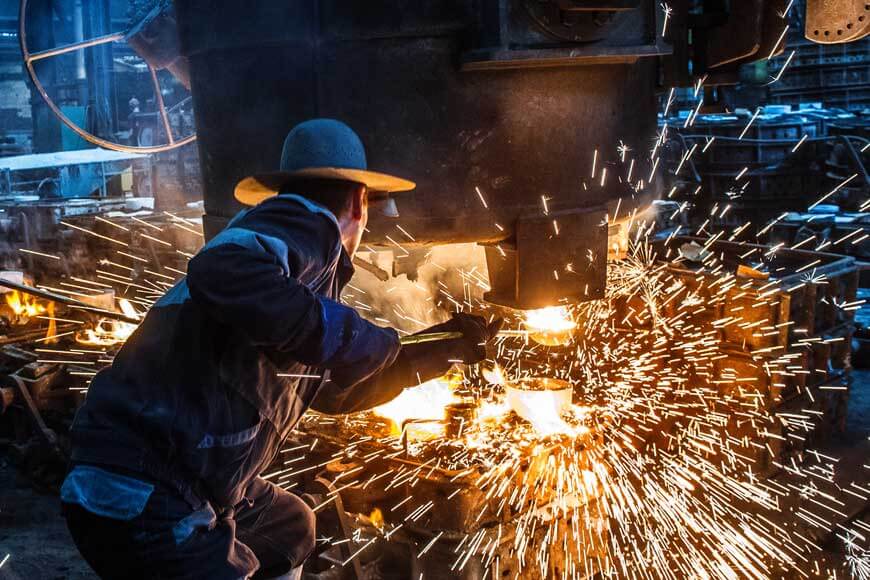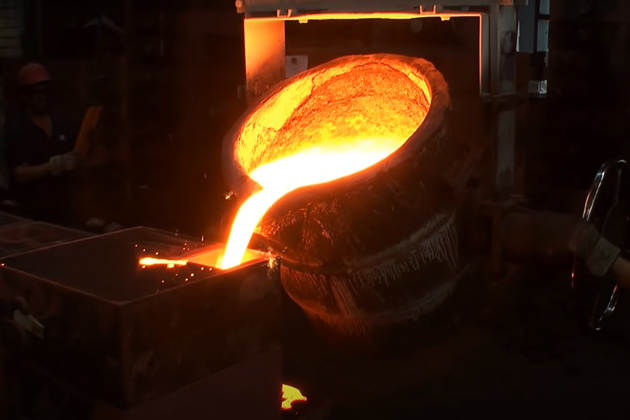Important distinctions between Metal Casting and other metal fabrication techniques
Just How a Metal Foundry Contributes to Sustainable Metal Production Practices
Metal foundries play a necessary duty in advertising sustainability within the metal production market. By incorporating recycled products, they reduce reliance on virgin resources and reduce environmental influences. Energy-efficient melting procedures even more decrease energy consumption and exhausts. The journey towards sustainable techniques includes even more than just reusing and power management. It encompasses a broader dedication to ethical sourcing and ingenious innovations. The ramifications of these techniques are considerable and warrant more detailed examination.
The Function of Recycling in Metal Foundries
While metal production has traditionally relied upon virgin materials, the raising emphasis on sustainability has resulted in a significant change in methods, specifically in metal foundries. Recycling has arised as a vital component of this transformation, permitting foundries to repurpose scrap metal and lower reliance on extracted sources. By integrating recycled materials into their procedures, foundries not just decrease ecological influence yet also reduced manufacturing costs.
Making use of recycled metals, such as copper, steel, and aluminum, lessens power usage and lowers greenhouse gas emissions linked with conventional mining and refining techniques. Foundries can achieve top quality outputs by employing advanced sorting and handling technologies to ensure the purity of recycled products. This focus on reusing fosters a round economy, where waste is minimized, and resources are used effectively. Metal foundries play an essential function in promoting sustainable practices within the metal production industry.
Energy-Efficient Melting Techniques
Energy-efficient melting strategies are important for improving sustainability in metal production. These methods considerably reduce power intake throughout the melting process, which is one of the most energy-intensive stages in metal production. Technologies such as induction melting, resistance heating, and microwave melting deal boosted effectiveness compared to standard methods. Induction melting, as an example, makes use of electromagnetic fields to generate warmth straight within the metal, reducing power loss and offering specific temperature level control.
In addition, applying warm healing systems can additionally boost performance by recycling and catching waste warmth created throughout melting. Utilizing advanced insulation products and maximizing heater styles also add to energy financial savings. By adopting these cutting-edge melting techniques, metal foundries can decrease their carbon footprint, decrease operational costs, and add to a more lasting manufacturing landscape. The assimilation of energy-efficient techniques not only lines up with ecological objectives yet additionally meets the expanding need for liable manufacturing techniques in the metal market.
Sustainable Sourcing of Raw Materials
Lasting sourcing of raw materials is important for reducing the ecological influence of metal production. This entails the enhanced usage of recycled metals, the fostering of honest mining techniques, and initiatives targeted at regional sourcing. By focusing on these methods, the sector can promote liable source administration and assistance local economies.

Recycled Metal Application
Exactly how can sectors effectively lower their ecological influence while satisfying the expanding need for metal? One substantial method is the application of recycled metal. By integrating scrap metal right into their manufacturing procedures, foundries can lower the removal of virgin materials, thereby lowering and conserving all-natural resources energy usage. Recycled steels need much less power to procedure compared to their raw equivalents, bring about lower greenhouse gas emissions. Furthermore, the use of recycled metal helps divert waste from landfills, advertising a circular economic climate. Industries that prioritize recycled metal not just add to sustainability yet likewise benefit from price savings connected with lowered material procurement. Recycled metal utilization stands as an essential technique for ecologically responsible metal manufacturing.
Honest Mining Practices
While the demand for steels remains to climb, sectors are significantly acknowledging the value of ethical mining methods in making certain responsible sourcing of raw products. Honest mining incorporates a commitment to environmental stewardship, social obligation, and adherence to reasonable labor practices. Firms are now prioritizing partnerships with mines that show transparency in their operations, decreasing environmental influence and appreciating regional areas. This strategy not only cultivates a sustainable supply chain however also improves the reputation of services entailed. By implementing extensive requirements and certifications, markets can fight unlawful mining activities and promote the welfare of employees. Inevitably, honest mining practices contribute substantially to a more lasting metal manufacturing ecological community, straightening financial growth with ecological and social honesty.
Local Sourcing Efforts

Advancements in Metal Casting Procedures
Technologies in metal casting procedures are transforming the sector by incorporating innovative recycling methods that decrease waste. Energy-efficient melting methods are additionally being developed to decrease power consumption throughout manufacturing. Additionally, the usage of innovative mold and mildew products contributes to boosted performance and sustainability in casting operations.
Advanced Recycling Techniques
Advanced recycling strategies are transforming metal casting procedures, considerably enhancing sustainability in the market. These advancements concentrate on recovering and reprocessing scrap metal, considerably reducing waste and the requirement for virgin products. Strategies such as hydrometallurgy and pyrometallurgy make it possible for foundries to remove important metals from used parts, ensuring efficient resource usage. Additionally, progressed sorting and purification innovations enhance the top quality of recycled metals, making them appropriate for high-performance applications. This not only reduces the environmental impact of metal manufacturing yet additionally fosters a round economic climate by advertising the reuse of materials. As these reusing methods continue to progress, they assure to additionally enhance operations within foundries and contribute to a more lasting metal production go right here landscape.
Energy-Efficient Melting Techniques
While standard melting techniques have actually long been the foundation of metal casting, current innovations have presented energy-efficient strategies that noticeably minimize energy consumption and emissions. Technologies such as induction melting and electrical arc furnaces have gotten prestige, allowing for precise control over temperature and reducing the need for fossil gas. These methods not just enhance power performance but additionally promote faster melting times, which equates to reduce functional expenses. Furthermore, innovations in warmth healing systems allow foundries to record and reuse excess warm generated during the melting procedure. This holistic approach to energy additional info administration not just supports lasting techniques yet likewise settings metal foundries as leaders in the change towards greener production processes, better aligning with global sustainability goals.
Innovative Mold Products
As the need for more reliable and sustainable metal casting processes grows, the exploration of ingenious mold and mildew products has ended up being a prime focus in the industry. Traditional mold materials often add to ecological difficulties, triggering the search for options that reduce waste and energy usage. Recent advancements include the development of recyclable compounds and biodegradable binders, which not only improve mold and mildew efficiency yet also reduce eco-friendly effect. In addition, the usage of 3D printing technology in mold and mildew creation permits complex layouts that reduce product use and allow quick prototyping. These innovative products not only enhance casting precision yet likewise align with sustainability objectives, showcasing the sector's dedication to lowering its carbon footprint while preserving top quality manufacturing standards.
Reducing Waste Via Advanced Modern Technology
Innovative technologies are transforming the metal production sector by considerably reducing waste and enhancing performance. Advanced information analytics and artificial intelligence formulas enable foundries to maximize manufacturing processes, recognizing inefficiencies and decreasing scrap product. Smart sensors check tools efficiency in real-time, enabling anticipating maintenance that lowers downtime and waste generation. Furthermore, additive production strategies, such as 3D printing, permit the production of facility elements with very little product usage, substantially reducing waste contrasted to conventional methods.
Closed-loop systems are coming to be a lot more common, in which scrap metal and results are reused back into the production cycle, guaranteeing that materials are made use of to their greatest potential. This integration of modern technology not just advertises source preservation but additionally enhances the overall sustainability of metal manufacturing techniques. By accepting these developments, foundries can contribute to a much more lasting future while keeping competitiveness on the market
The Impact of Foundries on Carbon Impact Reduction
Foundries play a crucial role in minimizing the carbon footprint of the metal production industry by applying numerous lasting practices. By using energy-efficient innovations, such as electrical arc heating systems, these internet facilities substantially reduced greenhouse gas exhausts contrasted to typical methods. In addition, foundries significantly adopt renewable resource resources, which additionally diminishes their dependence on fossil fuels.
Recycling scrap metal is one more essential technique that foundries use, conserving sources and minimizing the requirement for virgin products. This not just reduces waste yet also minimizes the energy-intensive extraction procedures connected with mining. Furthermore, the adoption of closed-loop water supply helps to minimize water usage and minimize wastewater discharge, adding to an extra sustainable operation.
Through these campaigns, foundries show their commitment to environmental stewardship, resulting in a marked reduction in the overall carbon impact of the metal production market. Their continuous initiatives are crucial in the shift towards an extra lasting commercial landscape.
Often Asked Inquiries
What Kinds of Metals Are The Majority Of Typically Recycled in Foundries?
Aluminum, brass, copper, and steel are amongst the most typically recycled metals in foundries. These metals are favored because of their high recycling rates, economic value, and extensive accessibility, adding significantly to industrial sustainability efforts.
How Do Foundries Make Certain the Quality of Recycled Materials?
Foundries establish the high quality of recycled products with strenuous screening, sorting, and filtration procedures. They carry out sophisticated modern technologies to examine structure and eliminate pollutants, assuring that the recycled metals satisfy sector criteria for performance and security.
What Certifications Exist for Sustainable Foundry Practices?
Numerous certifications exist for sustainable foundry practices, including ISO 14001 for environmental management, ISO 50001 for power administration, and LEED accreditation for sustainable building techniques (Metal Casting). These certifications aid ensure adherence to ecological and sustainability standards in procedures
Just How Do Foundries Determine Their Carbon Impact Decrease?
Foundries measure carbon impact decrease via devices like lifecycle evaluations, energy audits, and exhausts tracking systems. They compare standard exhausts to existing results, examining improvements in energy efficiency, material usage, and sustainable power adoption gradually.
What Are the Financial Benefits of Lasting Metal Manufacturing?
Lasting metal production provides economic benefits such as reduced functional costs, enhanced effectiveness, enhanced market competition, and possible government motivations. Additionally, it fosters development and brings in ecologically mindful consumers, inevitably driving long-lasting productivity for companies.
Metal foundries play a vital role in promoting sustainability within the metal manufacturing sector. While metal production has traditionally counted on virgin products, the boosting focus on sustainability has led to a considerable shift in techniques, specifically in metal foundries. By incorporating scrap metal right into their manufacturing procedures, foundries can decrease the removal of virgin products, thereby reducing and preserving natural sources power intake. Foundries play a crucial function in decreasing the carbon impact of the metal production market by executing numerous sustainable practices. Recycling scrap metal is an additional vital method that foundries utilize, conserving sources and minimizing the demand for virgin products.